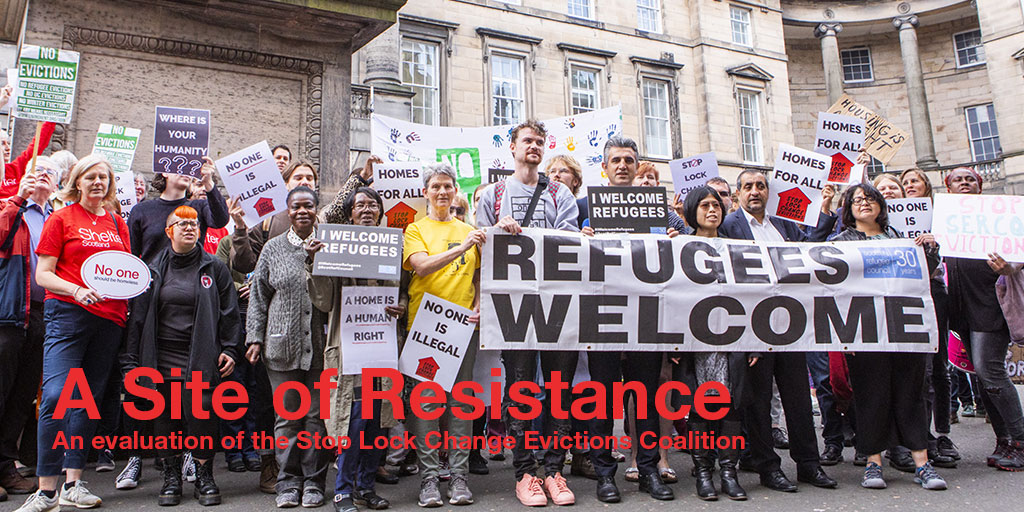Report outlines ten-point plan to prevent lock-change evictions
Immediate and fundamental reform of the asylum system is required to prevent lock-change evictions, destitution and street homelessness of some of the most vulnerable people in Scotland, according to a new report.

Evaluating the campaign by the Stop Lock Change Evictions coalition, ‘A Site of Resistance’ was commissioned by Scottish Refugee Council, JustRight Scotland and Shelter Scotland on behalf of the coalition and was written by independent researcher Helen Baillot.
In July 2018, asylum accommodation provider Serco announced that it would evict 300 people from their homes via lock-change evictions if they were no longer eligible for asylum support.
Anticipating a humanitarian crisis, a group of charities, lawyers and campaigners came together to resist and overturn this policy and support people at risk.
This group became the Stop Lock Change Evictions coalition.
Today, the coalition remains resolute that people seeking asylum should never be subject to summary eviction, destitution and street homelessness by lock change.
The report outlines ten recommendations for the UK, Scottish, and local governments to consider in order to fight destitution among immigrant communities:
- The Mears Group, now providing accommodation on behalf of the Home Office in Scotland, must introduce a policy on how they will deal with people refused asylum and asylum support. This must include a commitment to seek a court order to effect an eviction and not to evict by way of lock changes. This should be adopted by other providers across the UK.
- The Home Office must place a requirement on all accommodation providers to never conduct summary lock change evictions. The Scottish Government should amend existing housing legislation to ensure lock changes are unlawful.
- The UK Government must cease to use destitution as a policy tool and instead ensure that all people seeking asylum can access financial support and accommodation so that they can meet their essential living needs until they return to their country of origin or are given leave to stay in the UK.
- The UK Government must grant temporary protection to people who face barriers to return which are beyond their control; and
- The UK Government must restore people seeking asylum the right to work, so they can be independent and reduce the cost of asylum support. This should remain in place until people have either been granted leave to remain or returned to their country.
- The Scottish Government and COSLA must ensure that its forthcoming strategy to prevent and mitigate migrant destitution includes asylum and refugee destitution; upholds rights in housing, health, social care, anti-poverty and human trafficking exploitation; and the strategy funds interventions so those at risk of asylum homelessness are not on the streets.
- Scottish local authorities must have policies and processes in place to ensure that all vulnerable people can access community care protection under existing legislation regardless of immigration status.
- The Scottish Government should review the adequacy of the Community Care legislative framework.
- Glasgow City Council, third sector partners and those with lived experience introduce a locally designed end of asylum process safety net in Glasgow.
- The Law Society of Scotland, Scottish Legal Aid Board and Scottish Government should address the very limited pool of social justice lawyers with capacity and expertise to work across housing, community care, asylum support, and asylum and immigration laws.
Graham O’Neill, policy manager at the Scottish Refugee Council, said: “If it weren’t for this [coalition] many vulnerable people would have been callously rendered homeless. That is human suffering on a mass scale, inflicted on those with nothing by a UK state and a company – Serco – worth billions.
“Glasgow’s social justice lawyers, refugee rights agencies and grassroots campaigners have without doubt, saved lives. They have shown how to challenge and frustrate unaccountable state power; we need to keep doing that and inspire other ‘asylum areas’ – Liverpool, Manchester, Newcastle and many others – to do the same.”
The Stop Lock Change Evictions coalition has recently secured funding from the Scottish Government to deliver a specialist service for people at risk of eviction and destitution.







